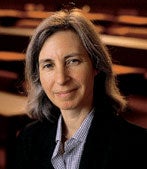Harvard Law School Professor Martha Minow is co-editor of “Just Schools: Pursuing Equality in Societies of Difference,” a new book exploring ways to create more equal schools in an increasingly multicultural America. The book includes chapters from legal scholars, educators, and social scientists with widely divergent methods of fostering equality, including a chapter by Minow considering the impact of school choice reforms on equal educational opportunities.
Minow recently discussed how courts are interpreting the separation between church and state with respect to education in the Boston Globe. During the interview with reporter Rick Barlow, printed on June 22, Minow explained the legal issues at stake. An excerpt of the interview follows:
Q. You’d think “equality of education” would be simple to define. What’s this disagreement over?
A. Equality could mean making sure every student has an identical education. On the other hand, equality could mean ensuring each family an equal chance to provide an education that reflects its own values. We really are in the midst of a sea change. In this century, there has been a view that government does not fund religious schools. In Massachusetts, it’s actually written in the constitution. Therefore, equal treatment for parents who want religious education for their [children] means they have to pay for it themselves. There have been efforts in many jurisdictions to provide subsidies to religious education, most of which failed until recently.
The sea change is this: The Supreme Court has started to view the question of government aid to religion in a mode of equality, rather than [the mode of] separation between church and state. If there is funding available for nonreligious schools, then there should be funding available for religious schools. The Zelman case [involving testing of the permissibility of vouchers in Cleveland argued in 2002 before the Supreme Court] allows dollars to be spent on private religious schools, so long as the parents are making the choice [for those schools]. Vouchers are possible, and some people are exploring the use of charter schools – if not for fully religious schools, at least with supplementary religious education.
Q. As a legal scholar, do you think the federal courts are correctly protecting individual religious expression, or are they foolishly breaching the church-state wall?
A. I think there is merit to the view emerging in the Supreme Court that religious schools should not be treated worse than other groups. When the government is providing aid for computers or textbooks available to any school – including private schools – then why shouldn’t religious schools also have some access to those government resources? When we move all the way to full funding of tuition and teachers, I become somewhat concerned, because then the government understandably would want to have control and review over what the religious schools are doing. And that’s not a recipe for a healthy religious life.
Continue reading the Boston Globe article, “Redefining equality for religious schools.”
